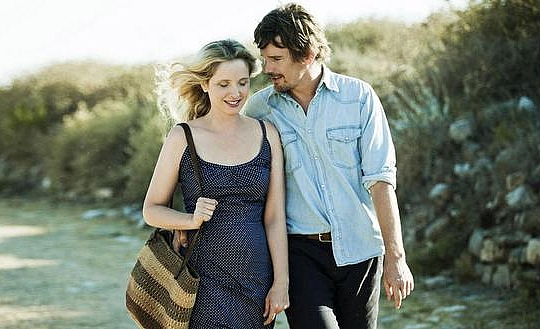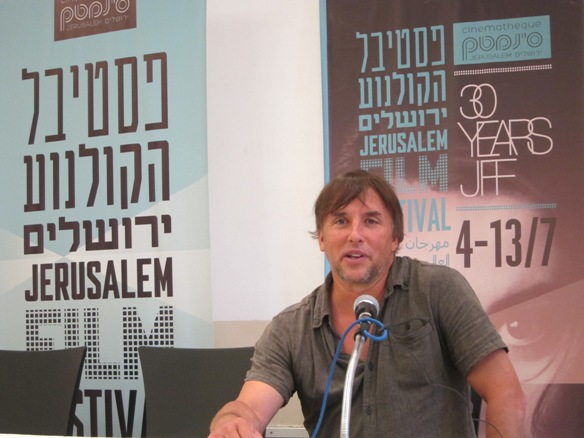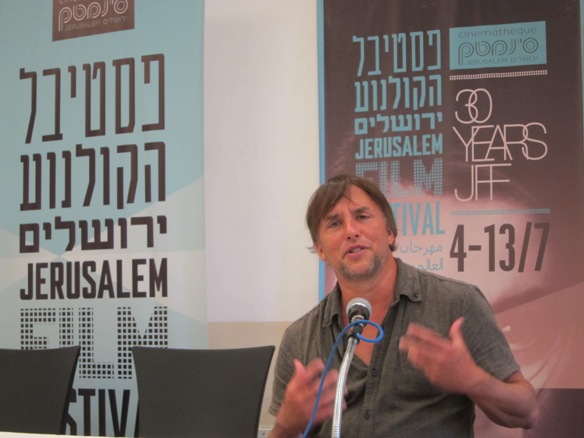
The Jerusalem Film Festival 2013 closed with the most recent (final?) chapter in director Richard Linklater’s romantic trilogy, Before Midnight. Just hours after arriving in Jerusalem, Linklater jumped right into a press meeting for a conversation on love, life and film at the Jerusalem Cinematheque.
Before Midnight meets Jessie (Ethan Hawke) and Celine (Julie Delpy), nine years after their reunion in Before Sunset, eighteen years after their first night together in Vienna (Before Sunrise). Now married, and the parents of twin daughters, the couple are on vacation in Greece. Can romance endure despite the pressures of everyday life? Watch the film for the answer to that question, at least for Jessie and Celine, and read here for answers to some other questions that came up in the conversation.
Is this the last chapter, or will Jessie and Celine return in another nine years or so?
Richard Linklater: We’re on hiatus from those two characters, Julie and Ethan say it takes nine years to recover, so…no one knows what they’re doing nine years from now, do you know what you’re doing nine years from now? It’s happened two times now that we’ve realized Jessie and Celine are still with us and demanding us to make a movie about them, so…
Can one see Linklater, Hawke and Delpy in the characters of Jessie and Celine?
RL: These films are very personal, they’re not specifically autobiographical. They really are about stages of life. Julie and Ethan are the age, they are those characters. I’m about ten years older. In the first film as we were re-writing the script together, I think they did participate more in their characters. What’s going on now from the writer’s standpoint (Hawke and Delpy are co-writers on the Before Midnight screenplay), not from an actor’s standpoint at all, we all write for everybody. I’ve always found myself in both characters and Julie and Ethan very much so. Like Julie has a very strong masculine side, and Ethan and I have this feminine side too, so it’s really about the big subjects. But they’re beyond just being actors, they’re co-creating with me. It’s a unique collaboration, it’s kind of an extension of how I work with actors.

Are the realities of mid-relationship, coping with life and its responsibilities, too depressing for film?
RL: We all like the fresh bloom of romance. Let me tell you, it’s easier to depict, it’s more fun to watch maybe… that was the challenge this time: to show people in mid-relationship. They don’t make a lot of movies about that for a good reason. It’s not sexy. Our job was to make it at least an honest exploration of that. These movies… it was never a big arching plan of ours, but they do depict different stages of your life development. When you’re twenty three there’s so much you don’t know, but it’s kind of sweet. I mean, twenty three, you’ve been through a lot, they’ve clearly been through relationships but their lives are so much ahead of them. It’s amazing to us – we do sit and watch those previous movies.
It’s very different – the unattached nature of being twenty three, and then in the second film you feel the walls have closed in a little bit. By your early 30s some things have solidified. You’ve given up a lot of things, but you’ve discovered more about yourself, and they talk about that openly in the movie. Even the nature of the movie… in the first one they don’t have to be anywhere, no one’s waiting on them. In the second film he’s basically at work, he’s got a plane to catch, life is scheduled, he’s got life obligations, people waiting on him. In this one even more so, he’s got the kid from the first marriage. Just look where their lives are!
I don’t consider it depressing. It’s more challenging, but you’re more equipped for the challenge as you get older hopefully, and you can find some humor in that and you can find some there is some beauty in that…
People ask – would this one be romantic? I remember talking to Ethan and Julie, that was a question: people think these other two movies are romantic, is this romantic? Is it romantic? I don’t know… I think it is, by the new over-40 definition of romantic, which is different from twenty three. Well, if you’re still communicating, you’re still talking, that’s pretty good. You still kinda wanta sleep together, that’s pretty good. That’s not bad at a certain age, about as good as you’re gonna do.
Linklater on his writing process:
RL: It’s a unique dynamic between Ethan and Julie and I. I write with them the way I write a script alone – I have a really specific outline, you know, beginning, middle and end. We spend about a year thinking about that. This time it was different I think, because of our lives: everyone’s a parent, everyone’s busy. On the previous film we were able to email each other material, we had a creative process apart… OK you guys are coming over and we’re gonna sit in a room together this time. We’re all living close to one another in Greece at this point… we play around a lot, we talk, digress and make jokes. We push each other, we encourage one another, we’re kind of tough on one another as old friends might be. We cut out about 90% of the material brought forward, it gets rejected pretty quickly… I enjoy the process, but there’s not one thing in the movie that we don’t all agree on, I guess that’s what I’m trying to say.
The conversations between Jessie and Celine have garnered much praise for their natural quality. Is there any improvisation during shooting?
RL: Never… As a director if I don’t understand it or fully embrace an idea it’s not going to work in the film and likewise I can’t ask the actors to do something that they don’t agree with or understand. Most acting, you get paid to dramatize or say something that you don’t feel that connected to, that’s usually kind of ridiculous. That’s what a good actor does: he makes goofy stuff seem real. But what we’re trying to do here, it would never work for the kind of reality we’re attempting to create. I can’t explain to you how rehearsal intensive our process is, it goes from a very intense writing process to a very intense rehearsal process, to a really intense shooting process. That’s why I said the actors take 9 years to recover… then they have me saying: Oh, I want to do that in one take.
We never turn the camera on and they say things that aren’t rehearsed, that never happens. We might change something while we’re shooting, but it’s a very intensive rehearsal process for them because the reality I’m going for, trying to get in the movie, is no acting at all, which is hard to do with non dramatic material. I think the more challenging scenes are when there’s walking and talking and there’s no real dramatic through line, and it’s even hard to remember that dialogue, it digresses and meanders – cause we’re trying to mirror how we all talk in real life, which isn’t perfectly structured and written out. We’re talking about one thing, and then it’ll just kind of fizzle out, and someone will ask a question… you know, we’re trying to mirror that. I’ve always been fascinated with that, it’s hard to act that. As intelligent actors as they are, it’s just really hard to do, that’s the big challenge. I like the moment when they realize how much dialogue they have to memorize, even though they helped write. They just get this kind of ‘oh shit what am I doing.’

Linklater has been a prolific filmmaker, with both independent films like Before Midnight and its predecessors, and more mainstream films like Dazed and Confused, and School of Rock to his credit, and several projects in the works – his view on filmmaking:
RL: I have a low threshold in my mind of what a film can be obviously – two people talking… you know, I can make a film about anything, so that part of myself probably necessitates a lot of films to express myself…
I like the old studio people from the 40s 50s who made two films a year for twenty five years. That’s pretty cool. That would have been frustrating, but it would have had its rewards – to get a call from Darryl Zanuck: ‘I have this book by John Steinbeck and you’re gonna do it’… OK I got Hank Fonda… and that’d be pretty cool to be in that privileged spot that a handful of directors were… I’d have been that guy in poverty row, but I can fantasize I’d have been John Ford or Vincent Minelli.
Looking back, would he change anything about his previous films?
RL: You know it’s humbling to look back at a film I’ve done 19 years ago and just go: I haven’t really progressed at all, I think about films the same way. I have the feeling everybody else is growing and I feel that I’m the same….on the other hand I don’t look back and say I would do anything different, ever. I just don’t. I did my best, gotta live with it.
That’s why you have to work so hard. I would only look back if I thought I was lazy and I didn’t push myself and everyone else I was working with to the absolute limit. You can accept defeat like an athlete – you lose graciously, you tip your hat to your opponent when you know you did your best and you came up short, but if you didn’t … in the arts there isn’t an opponent, there’s just yourself and the world. You just have your own relationship with everything you do. I learn a lot, there’s no substitute for experience. You learn so much. You like to think you’re better, you know how to work with people better, but just at the moment you think you know something – things fall apart in new ways, there’s new challenges. There’s always something different, difficult. It’s a puzzle every time. I don’t think anyone knows what they’re doing exactly, I certainly don’t.
Questioned on the issue of illegal downloading, Linklater said he’s been told that his film A Scanner Darkly (2006, based on the eponymous novel by Philip K. Dick) has been downloaded millions of times, and commented that if the producers of that film had a dollar for each download, they might still be working in the film industry. Yet his outlook remains accepting and optimistic:
RL: It’s just the reality. It says to the industry to stay ahead of it and monetize it.
I’ve never been one of those who think you should wait six months for a DVD. I grew up in a little town – you hear about the culture happening everywhere else but it’s denied you. and I think technologically everything should be available to everyone, no matter where you live, and I don’t even like these borders, it should be international. Everything should just be more available.
Will there be a future film about Jessie and Celine?
RL: We’re not ruling out anything. We were joking that our last film would be a comedic remake of Amour (2012, directed by Michael Haneke). So there’s hope… we’ll find something funny to say at that age.





